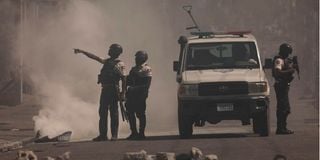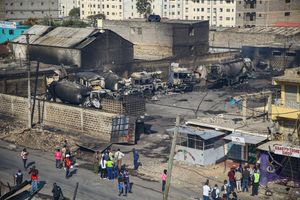
Police officers stand guard during a protest against Prime Minister Ariel Henry's government and insecurity, in Port-au-Prince, Haiti March 1, 2024.
It is obvious why the government had to put on hold departure of the Kenyan police contingent supposed to spearhead an international security mission to the troubled Caribbean island nation of Haiti.
It seemed it was all systems go when Haiti Prime Minister Ariel Henry came calling and signed the necessary instruments with President William Ruto.
Then it turned out he couldn’t return to his country as armed criminal gangs had taken over the airport, and shortly afterwards he was forced to resign.
For those vehemently opposed to sending our policemen on what they see as a suicide mission, the PM’s resignation might have been a blessing in disguise; it was followed with the announcement that departure of the 1,000-strong contingent would have to be postponed since there was no functioning authority in Haiti to work with.
Perhaps we could invite the most powerful and notorious of the gang leaders, Jimmy Cherizier, aptly nicknamed ‘Barbeque’ to sign an agreement with President Ruto, but the problem is that the thug has threatened to throw into the fire any Kenyan or other foreign troops that dare intervene in the country.

Former police officer Jimmy "Barbecue" Cherizier, and leader of an alliance of armed groups, speaks to a news outlet on a mobile phone during a news conference, in Port-au-Prince, Haiti, March 11, 2024.
As we wait on developments in Haiti around the stalled installation of an interim administration following Prime Minister Henry’s surrender, there will be time to debate further on whether Kenya really needs to be part of the Multinational Security Support Mission in Haiti approved last by the United Nations Security Council last October.
Prime Cabinet Secretary and CS for Foreign Affairs Musalia Mudavadi and Interior CS Kithure Kindiki should be engaging their minds on whether there is need for a rethink on the Haiti mission.
Of course Kenya has her international obligations and a proud history of successful military peacekeeping assignments in trouble spots on the African continent and beyond. Kenyan soldiers and police officers have performed commendably in Liberia and Sudan, both in West Africa, as well as in former Yugoslavia and other parts of the Baltic region in central Europe.
I am not one of those reflexively opposed to participation in Haiti. The choice of Kenya to lead the multinational mission was recognition of the leadership role the country has played in peacekeeping operations.
However, the credit mostly goes to the Kenya Defence Forces rather than a police service better known for an entrenched culture of corruption and incompetence from top to bottom.
Questions are also being asked on what goals are served by intervening in a country far, far away where we have no strategic interests or any links worth talking about.
It is instructive that all the other nations sending police contingents to Haiti are in the immediate vicinity. These are Caribbean Community members including Jamaica, Bahamas, Guyana, Barbados, Antigua and Bermuda who all have an obvious interest in security for their region.
So what is our interest in Haiti? The answer would be found in the same factors that influenced deployment of Kenyan peacekeeping troops to faraway places such as Croatia, Kosovo, Bosnia-Herzegovina, Slovenia, East Timor, Cambodia and Syria.
The difference, however, is that Haiti is not a conventional United Nations peace keeping operation. It is evident that the mission is not so much about keeping feuding forces apart and creating safety zones for civilians, but about helping an unpopular and corrupt regime keep its enemies at bay.
The Haitian police and military have been unable to contain the armed gangs that now control more than 80 per cent of the capital Port-au-Prince and all roads leading out into the countryside.
Foreign police officers will essentially be asked to step in where local forces have spectacularly failed, and take the war to gangs that have morphed from street criminals to irregular militias capable holding the dysfunctional state to ransom.
It could be a slaughterhouse in there. What is puzzling is that the two military and economic superpowers in the region, the United States and Canada, are applying great pressure on Kenya and the other multinational force nations to hurry up and gets boots on the ground in Haiti, but are themselves keeping their men and women in uniform far out of harm’s way.
The United States, in particular, is notorious for military interventions around the world, some with little rhyme or reason and mostly doomed to failure, yet is committing only cash, but no troops, to the Haiti mission.
They must know something that we do not know. Hence the need for further discussion on what exactly the Haiti mission will entail, the parameters of engagement, and a new evaluation of the risks involved.
[email protected]. @MachariaGaitho













